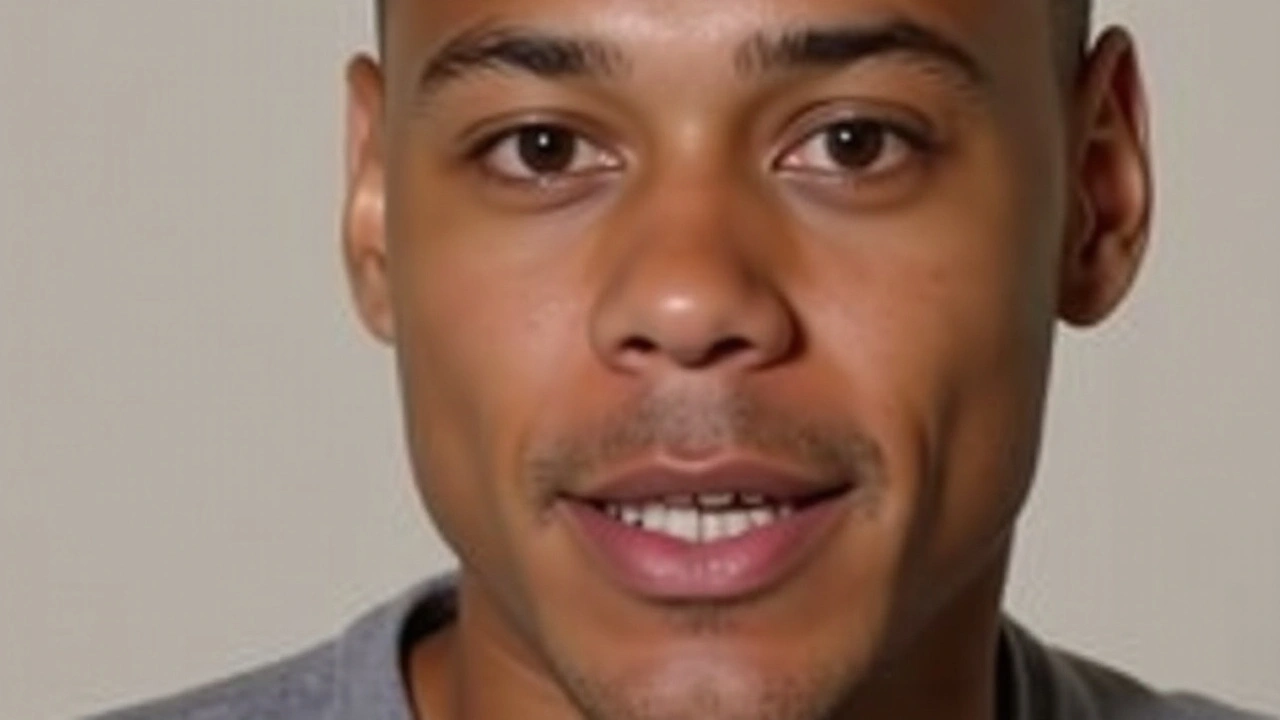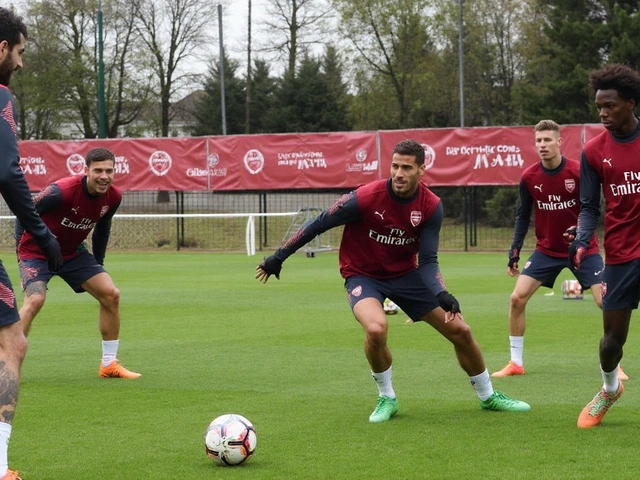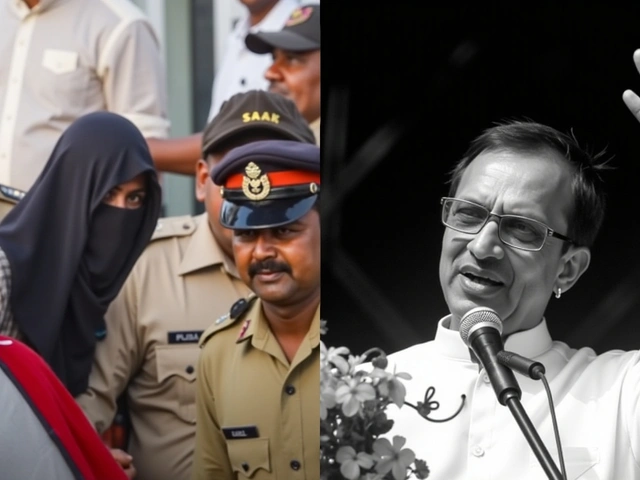Jermaine Jenas Dropped by the BBC: A Controversial Exit
The broadcasting world was shaken recently as the BBC announced it had dropped former England midfielder Jermaine Jenas from its lineup of pundits and presenters. Known for his insightful comments and professional demeanor, Jenas has been a familiar face on BBC’s football coverage for years. His sudden departure was attributed to alleged inappropriate behaviour, although specific details of the incident remain undisclosed.
Jenas, who was a regular fixture on popular shows like 'Match of the Day' and 'Football Focus,' was lauded for his in-depth analysis and engagement with audiences. His role extended beyond just the broadcasting booth; he became a bridge between the game and its fans, providing a unique perspective shaped by his professional career on the pitch. This sudden change has left many fans and colleagues in shock.
The Incident and Immediate Action
According to close sources, the BBC acted swiftly upon learning of Jenas's behaviour. The nature of the incident, while not detailed publicly, was considered serious enough to necessitate immediate action. This swift move aligns with the organization's staunch policy to uphold a standard of conduct that reflects its values and commitment to integrity. Removing Jenas from the broadcasting lineup underscores the BBC's zero-tolerance approach towards behaviours that fall short of these standards.
The decision to drop Jenas hasn't been made lightly. The BBC emphasizes the importance of maintaining a professional environment, particularly for individuals in the limelight who significantly influence public opinion and youth. This move is also seen as part of the larger effort to reinforce accountability within the network, ensuring that all its representatives uphold the highest level of professionalism.
Commitment to Professionalism
The BBC's decision to part ways with Jenas highlights a broader issue of maintaining professional conduct in high-profile roles. As public figures, broadcasters and presenters shoulder the responsibility of setting examples. Their behaviour off-camera can affect their credibility and, by extension, the credibility of the network they represent. For Jenas, this incident is a reminder that even seasoned professionals are not immune to the repercussions of their actions.
Professionalism in the media isn't just about on-screen performance; it encompasses overall conduct, including interactions with colleagues and the public. The BBC’s action sends a strong message that inappropriate behaviour, regardless of its context, won’t be tolerated. This stance resonates particularly in today’s climate, where public scrutiny and expectations for accountability are higher than ever.
Impact on Jenas's Career
Jenas's removal from the BBC serves as a critical juncture in his broadcasting career. Having transitioned from footballer to pundit, he had carved out a niche for himself in sports journalism. His future with the network remains uncertain as the BBC has yet to comment on the potential for reinstatement or if this marks a permanent end to his tenure.
This incident could have lasting repercussions on Jenas's career. Navigating the aftermath of such disciplinary action will be challenging, requiring a careful reassessment of his professional conduct and public engagement strategies. His ability to regain trust and credibility will hinge on how he responds and manages the fallout from this controversial exit.
Broader Implications for the Industry
Jenas's dismissal isn't an isolated instance but part of a larger dialogue on accountability in the media industry. Public broadcasters, sports networks, and other media organizations are increasingly under pressure to ensure their on-air talent and representatives adhere to stringent ethical standards. The emphasis on professional conduct reflects a growing recognition that broadcasters significantly influence public discourse and societal norms.
This case underscores the imperative for media entities to implement robust systems for monitoring behaviour, providing training on appropriate conduct, and fostering a culture of respect and professionalism. Such measures are essential not only for maintaining organizational integrity but also for preserving public trust.
As the industry continues to evolve, the stakes for maintaining these standards will only get higher. Media personalities must be acutely aware of the impact of their actions, both in and out of the public eye. The responsibility of setting and upholding professional standards is pivotal in fostering a trustworthy and ethical media landscape.
Conclusion
In conclusion, Jermaine Jenas's dismissal by the BBC following his inappropriate behaviour is a stark reminder of the high standards of professional conduct required in the media industry. His sudden exit from the broadcasting lineup has sent ripples across the journalism community, emphasizing the non-negotiable nature of ethical behaviour for public figures. While this marks a significant shift in Jenas's career, it also highlights the BBC's unwavering commitment to maintaining integrity and accountability among its broadcasters.
The incident serves as a critical lesson for all in the media landscape: maintaining professional standards is paramount. The role of a broadcaster extends beyond the camera, encapsulating the principles and values they represent. As the industry continues to navigate these challenging waters, the importance of upholding high standards of professionalism remains greater than ever.






This is wild. I loved Jenas on Match of the Day, but if he crossed a line, then the BBC had to act. No excuses. Period. 🚫
It's sad... he was so articulate, so thoughtful... but professionalism isn't optional, especially when you're on TV. One mistake can unravel years of trust.
Oh please. Bet it was some minor thing blown out of proportion. They're just trying to look woke. Next thing you know, someone gets fired for laughing too loud at a meeting.
I get the BBC had to act, but I hope Jenas gets a chance to learn and grow from this. Everyone deserves redemption if they're willing to change. Maybe he needs a mentor, not just a firing.
This is exactly why we need clear boundaries in media. No one should feel unsafe around anyone, even if they're famous. Silence isn't neutrality.
People forget that broadcasters are role models. Kids watch these guys. If Jenas did something inappropriate, the BBC didn't just protect their brand-they protected young fans.
I'm not surprised. The media has been covering up these things for decades. The fact that it's only coming out now means it was likely reported internally long ago and ignored.
It is imperative that institutions of public trust maintain the highest ethical standards. The BBC, as a globally recognized entity, must demonstrate unequivocal commitment to dignity and decorum in all professional interactions.
I'm heartbroken but I get it 😔💔 We need better people in media. Not just good analysts-good humans.
He was great on TV but people are more than their job. Maybe he needs help not a career ending
Yeah sure. And next they’ll fire someone for saying the wrong thing on a Zoom call. This is performative justice. No real investigation, just a PR stunt.
India needs more people like this. Accountability isn't punishment. It's correction. He’s a public figure. Own it.
I hope he takes this as a wake-up call. We all make mistakes, but when you’re in the spotlight, your actions ripple. Let him learn, let him grow.
Life is a journey. You fall, you get up. Maybe this is his moment to find himself again. Not everyone is bad just because they messed up once.
Funny how everyone screams for accountability until it’s someone they like. Then suddenly it’s 'he's a good guy' or 'it was misunderstood'.
He’s human. Let him fix it. We don’t need more cancel culture. We need more grace.
I bet this is all connected to that secret BBC meeting last year where they were told to fire more white men to look diverse. This is just the first one they picked. They don't care about the truth, just optics.
This is why we need better training. Not just firing. If you’re putting people on TV, you need to train them on boundaries, respect, power dynamics. This isn’t about punishment-it’s about prevention.
I mean, the BBC is just a state funded entity that has lost all cultural relevance. Honestly, if you're still watching Match of the Day in 2024 you're probably still using a CRT TV and listening to dial-up